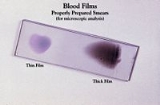
Clinical pathology
Encyclopedia
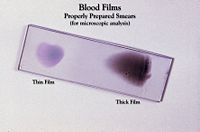
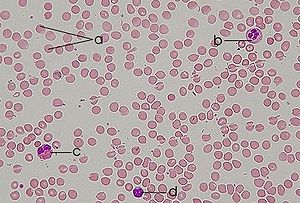
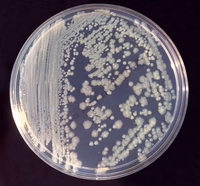
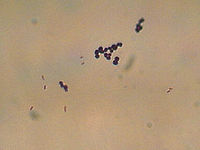
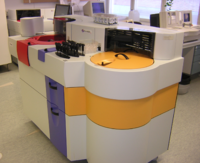
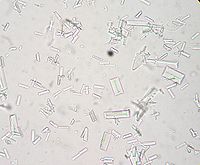
Medical laboratory
A medical laboratory or clinical laboratory is a laboratory where tests are done on clinical specimens in order to get information about the health of a patient as pertaining to the diagnosis, treatment, and prevention of disease.-Departments:...
analysis of bodily fluid
Bodily fluid
Body fluid or bodily fluids are liquids originating from inside the bodies of living people. They include fluids that are excreted or secreted from the body as well as body water that normally is not.Body fluids include:-Body fluids and health:...
s, such as blood
Blood
Blood is a specialized bodily fluid in animals that delivers necessary substances such as nutrients and oxygen to the cells and transports metabolic waste products away from those same cells....
, urine
Urine
Urine is a typically sterile liquid by-product of the body that is secreted by the kidneys through a process called urination and excreted through the urethra. Cellular metabolism generates numerous by-products, many rich in nitrogen, that require elimination from the bloodstream...
, and tissues using the tools of chemistry, microbiology, hematology
Hematology
Hematology, also spelled haematology , is the branch of biology physiology, internal medicine, pathology, clinical laboratory work, and pediatrics that is concerned with the study of blood, the blood-forming organs, and blood diseases...
and molecular pathology
Molecular pathology
Molecular pathology is an emerging discipline within pathology which is focused in the study and diagnosis of disease through the examination of molecules within organs, tissues or bodily fluids....
. This specialty requires a medical residency and should not be confused with Biomedical science, which is not necessarily related to medicine.
Licensing and subspecialties
The American Board of Pathology certifies clinical pathologists, and recognizes the following secondary specialties of clinical pathology:- Chemical pathology, also called clinical chemistry
- HematopathologyHematopathologyHematopathology is the branch of pathology which studies diseases of hematopoietic cells . In the United States, hematopathology is a board certified subspecialty practiced by those physicians who have completed general pathology residency and additional fellowship training in...
- Blood banking - Transfusion medicineTransfusion medicineTransfusion medicine is the branch of medicine that is concerned with the transfusion of blood and blood components. The blood bank is the section of the clinical laboratory where medical technologists process and distribute blood products under the supervision of a medical director, often...
- Clinical microbiology
- CytogeneticsCytogeneticsCytogenetics is a branch of genetics that is concerned with the study of the structure and function of the cell, especially the chromosomes. It includes routine analysis of G-Banded chromosomes, other cytogenetic banding techniques, as well as molecular cytogenetics such as fluorescent in situ...
- Molecular genetics pathologyMolecular pathologyMolecular pathology is an emerging discipline within pathology which is focused in the study and diagnosis of disease through the examination of molecules within organs, tissues or bodily fluids....
.
In some countries other subspecialties fall under certified Clinical Biologist
Clinical biologist
A Clinical biologist is an health professional, doctor in medicine , pharmacy, biology specialized in clinical biology, a medical speciality near from Clinical Pathology....
s responsibility :
- Assisted reproductive technologyAssisted reproductive technologyAssisted reproductive technology is a general term referring to methods used to achieve pregnancy by artificial or partially artificial means. It is reproductive technology used primarily in infertility treatments. Some forms of ART are also used in fertile couples for genetic reasons...
, Sperm bankSperm bankA sperm bank, semen bank or cryobank is a facility that collects and stores human sperm mainly from sperm donors, primarily for the purpose of achieving pregnancies through third party reproduction, notably by artificial insemination...
and Semen analysisSemen analysisA semen analysis evaluates certain characteristics of a male's semen and the sperm contained in the semen. It may be done while investigating a couple's infertility or after a vasectomy to verify that the procedure was successful. It is also used for testing donors for sperm donation, in stud... - ImmunopathologyImmunopathologyImmunopathology is a branch of medicine that deals with immune responses associated with disease. It includes the study of the pathology of an organism, organ system, or disease with respect to the immune system, immunity, and immune responses....
Organization
Clinical pathologists are often medical doctors.In some countries in South-America, Europe
Europe
Europe is, by convention, one of the world's seven continents. Comprising the westernmost peninsula of Eurasia, Europe is generally 'divided' from Asia to its east by the watershed divides of the Ural and Caucasus Mountains, the Ural River, the Caspian and Black Seas, and the waterways connecting...
, Africa
Africa
Africa is the world's second largest and second most populous continent, after Asia. At about 30.2 million km² including adjacent islands, it covers 6% of the Earth's total surface area and 20.4% of the total land area...
or Asia
Asia
Asia is the world's largest and most populous continent, located primarily in the eastern and northern hemispheres. It covers 8.7% of the Earth's total surface area and with approximately 3.879 billion people, it hosts 60% of the world's current human population...
, this specialty can be practiced by non-physicians, such as Ph.D or Pharm.D after a variable number of years of residency
Residency
Residency is the act of establishing or maintaining a residence in a given place.-United States of America:It is important in terms of politics, as candidates must maintain residency within the district in which they intend to run. Requirements vary by jurisdiction, and sometimes by the political...
.
In United States of America
Clinical pathologists work in close collaboration with clinical scientists (clinical biochemists, clinical microbiologists, etc.), medical technologistMedical technologist
A Medical Laboratory Scientist is a healthcare professional who performs chemical, hematological, immunologic, microscopic, and bacteriological diagnostic analyses on body fluids such as blood, urine, sputum, stool, cerebrospinal fluid , peritoneal fluid, pericardial fluid, and synovial...
s, hospital administrators, and referring physicians to ensure the accuracy and optimal utilization of laboratory testing.
Clinical pathology is one of the two major divisions of pathology
Pathology
Pathology is the precise study and diagnosis of disease. The word pathology is from Ancient Greek , pathos, "feeling, suffering"; and , -logia, "the study of". Pathologization, to pathologize, refers to the process of defining a condition or behavior as pathological, e.g. pathological gambling....
, the other being anatomical pathology
Anatomical pathology
Anatomical pathology or Anatomic pathology is a medical specialty that is concerned with the diagnosis of disease based on the gross, microscopic, chemical, immunologic and molecular examination of organs, tissues, and whole bodies...
. Often, pathologists
Pathology as a medical specialty
Pathologists are physicians who diagnose and characterize disease in living patients by examining biopsies or bodily fluid. Pathologists may also conduct autopsies to investigate causes of death. Pathology is a core discipline of medical school and many pathologists are also instructors...
practice both anatomical and clinical pathology, a combination sometimes known as general pathology
General pathology
General pathology, also called investigative pathology, experimental pathology or theoretical pathology, is a broad and complex scientific field which seeks to understand the mechanisms of injury to cells and tissues, as well as the body's means of responding to and repairing injury...
. Similar specialties exist in veterinary pathology
Veterinary pathology
Veterinary pathologists are doctors of veterinary medicine who specialize in the diagnosis of diseases through the examination of animal tissue and body fluids. Like medical pathology, veterinary pathology is divided into two branches, anatomical pathology and clinical pathology. Veterinary...
.
Clinical pathology is itself divided in to subspecialties, the main ones being clinical chemistry, clinical hematology
Hematology
Hematology, also spelled haematology , is the branch of biology physiology, internal medicine, pathology, clinical laboratory work, and pediatrics that is concerned with the study of blood, the blood-forming organs, and blood diseases...
/blood banking, hematopathology
Hematopathology
Hematopathology is the branch of pathology which studies diseases of hematopoietic cells . In the United States, hematopathology is a board certified subspecialty practiced by those physicians who have completed general pathology residency and additional fellowship training in...
and clinical microbiology and emerging subspecialities such as molecular diagnostics and proteomics
Proteomics
Proteomics is the large-scale study of proteins, particularly their structures and functions. Proteins are vital parts of living organisms, as they are the main components of the physiological metabolic pathways of cells. The term "proteomics" was first coined in 1997 to make an analogy with...
. Many areas of clinical pathology overlap with anatomic pathology. Both can serve as medical directors of CLIA certified laboratories. This overlap includes immunoassays, flow cytometry, microbiology and cytogenetics and any assay done on tissue. Overlap between anatomic and clinical pathology is expanding to molecular diagnostics and proteomics as we move towards making the best use of new technologies for personalized medicine.
In Europe
Recently, EFCCLM has chosen the name of "Laboratory medicine specialist" to define all European Clinical pathologists, regardless of their training (M.D, Ph.D or Pharm.D).
In France, Clinical Pathology is called Medical Biology ("Biologie médicale") and is practiced by both M.D.s and Pharm.Ds. The residency lasts four years. Specialists in this discipline are not called "Clinical pathologist" but "Clinical Biologist
Clinical biologist
A Clinical biologist is an health professional, doctor in medicine , pharmacy, biology specialized in clinical biology, a medical speciality near from Clinical Pathology....
".
Macroscopic examination
The visual examination of the taken liquid is a first main indication for the pathologist or the physician. The aspect of the liquid, in addition, conditions the analytical assumption of responsibility that follow and the validity of the end-results.Microscopic examination
The microscopic analysis is an important activity of the pathologist and the laboratory assistant. They have for that recourse to many different colourings (GRAM, MGG, Grocott, Ziehl-Neelsen…). The immunofluorescence, cytochemistry, the immunocytochimy and the FISH are also used in order to look further into the diagnosis.This stage makes it possible to affirm the character “normal”, tumoral, inflammatory even infectious of the liquid. Indeed, the microscopic examination often makes it possible to identify a causal infectious agent, in general a bacterium, a mould, a yeast, or a parasite, more rarely a virus.
Analyzers
See Automated analyserAutomated analyser
An automated analyser is a medical laboratory instrument designed to measure different chemicals and other characteristics in a number of biological samples quickly, with minimal human assistance....
.
The analysers, by the association of robotics and spectrophotometry, allowed these last decades a better reproducibility of the results of proportionings, in particular in medical biochemistry and hematology.
The companies of in vitro diagnosis henceforth try to sell chains of automats, i.e. a system allowing the automatic transfer of the tubes towards the various types of automats of the same mark. These systems can include the computer-assisted management of a serum library.
These analysers must undergo daily controls to guarantee a result just possible, one speaks about quality control. These analysers must also undergo daily, weekly and monthly maintenances.
Cultures
A big part of the examinations of clinical pathology, primarily in medical microbiologyMedical microbiology
Medical microbiology is both a branch of medicine and microbiology which deals with the study of microorganisms including bacteria, viruses, fungi and parasites which are of medical importance and are capable of causing infectious diseases in human beings...
, use culture media. Those allow, for example, the description of one or several infectious agents responsible of the clinical signs.
See also
- PathologyPathologyPathology is the precise study and diagnosis of disease. The word pathology is from Ancient Greek , pathos, "feeling, suffering"; and , -logia, "the study of". Pathologization, to pathologize, refers to the process of defining a condition or behavior as pathological, e.g. pathological gambling....
- Medical laboratoryMedical laboratoryA medical laboratory or clinical laboratory is a laboratory where tests are done on clinical specimens in order to get information about the health of a patient as pertaining to the diagnosis, treatment, and prevention of disease.-Departments:...
- Anatomic pathology
- Medical technologistMedical technologistA Medical Laboratory Scientist is a healthcare professional who performs chemical, hematological, immunologic, microscopic, and bacteriological diagnostic analyses on body fluids such as blood, urine, sputum, stool, cerebrospinal fluid , peritoneal fluid, pericardial fluid, and synovial...
- Veterinary pathologyVeterinary pathologyVeterinary pathologists are doctors of veterinary medicine who specialize in the diagnosis of diseases through the examination of animal tissue and body fluids. Like medical pathology, veterinary pathology is divided into two branches, anatomical pathology and clinical pathology. Veterinary...
- Biological pharmacistBiological pharmacistIn France and in other countries like Portugal, Spain, Belgium or Switzerland, a Biological pharmacist is a Pharmacist specialized in Clinical Biology a speciality similar to Clinical Pathology....
- Residency (pharmacy)
- Clinical BiologistClinical biologistA Clinical biologist is an health professional, doctor in medicine , pharmacy, biology specialized in clinical biology, a medical speciality near from Clinical Pathology....
- Laser capture microdissectionLaser capture microdissectionLaser capture microdissection , also called Microdissection, Laser MicroDissection , or Laser-assisted microdissection is a method for isolating specific cells of interest from microscopic regions of tissue/cells/organisms....

